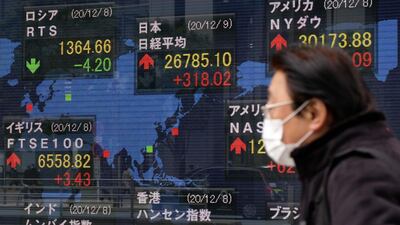Japanese robo-adviser WealthNavi made its debut on the Tokyo Stock Exchange on Tuesday in one of the biggest initial public offerings on the bourse this year.
The wealth management platform raised ¥17.9 billion ($173 million) and was up by about 50 per cent at the open from its listing price of ¥1,150.
With a market value of ¥52bn, it is among the largest of about 100 listings in Tokyo this year, despite being just five years old.
The stellar first-day pop came after several well-performing debuts in Asia and the US in recent weeks as investors rushed to buy some of the high-flying technology names.
Home-rental platform Airbnb closed 113 per cent above its listing price in its debut earlier this month.
JD Health International was up 56 per cent while DoorDash rose by 86 per cent on their first day of trading.
WealthNavi is banking on providing an inexpensive asset management platform with a low barrier of entry in a market where retail investment is growing.
Authorities have been promoting personal investment to make up for feared shortfalls in pension funds, with vast numbers of the population set to retire over the coming decades.
WealthNavi had about ¥320bn under management and 350,000 accounts as of December 7.
It offers a simple approach to investing: by answering six questions related to income and risk appetite, the platform generates a portfolio in one of five different risk levels, allocating money into a combination of exchange-traded funds.
The company was founded in 2015 by Kazuhisa Shibayama, a former finance ministry official who later worked at McKinsey. Mr Shibayama was struck by what he called the “financial disparity” between his relatives in Japan and the US.
During a holiday with his wife’s American parents, Mr Shibayama was asked by his mother-in-law to check the assets they had tasked a private bank with managing.
He found they had several millions of dollars in assets, largely ETFs, while his own parents in Japan had left much of their assets in cash deposits.
“I thought my family was well off,” he wrote on the company’s website, “but there was a 10-fold difference between their assets and my in-laws’.”
The analogy is typical of investments in the two countries. A survey by the Bank of Japan found that cash and deposits made up more than half of household assets in Japan, with less than 10 per cent invested in stocks. In the US, about 33 per cent of assets were in equities.

But WealthNavi is debuting at a time when amateur investment in Japan is heating up. Online brokerage accounts have surged in 2020, while retail investors made up an average of 21 per cent of total trading value on the Tokyo Stock Exchange in the past six months, versus just 16 per cent the year earlier.
WealthNavi “has benefited from the equity market rally from 2017 and onwards,” said Shin Tamura a Bloomberg Intelligence analyst, who cautions that such favorable conditions may not last. “It hasn’t fully experienced a bear market. Robo-advisors are not perfect, and there may be clients who don’t fully understand that.”

